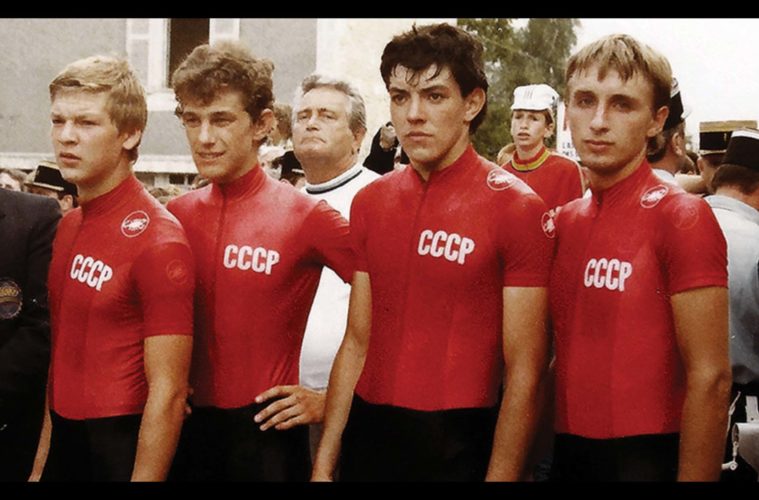[et_pb_section bb_built=”1″ admin_label=”section”][et_pb_row admin_label=”row”][et_pb_column type=”1_4″][et_pb_text use_border_color=”off” border_color=”#ffffff” border_style=”solid” _builder_version=”3.15″]
Thirty-five years ago, four Soviets won the team time trial at the junior world championships. Nikolai Razouvaev was amongst them. There is a TTT for stage two of the upcoming Tour de France… and it prompted Razouvaev to write a few thoughts on a discipline he has a love/hate relationship with.
[/et_pb_text][/et_pb_column][et_pb_column type=”3_4″][et_pb_text use_border_color=”off” border_color=”#ffffff” border_style=”solid” _builder_version=”3.15″]
I went to check the Tour de France stages this morning and they’ve got a team time trial for stage two. A short one – 27.6km.
They used to be longer — 67.5 km in 2005. Remember that one? Team Discovery Channel won it averaging 57.3km/h. Some speed hey? It’s the stage where Zabriskie crashed near the finish line and lost the yellow jersey.
I’ll leave chat about time trial bikes alone for now and ask you this: do you think team time trials should be part of a Grand Tour?
They’ve raced TTTs since I don’t when… the 1960s for sure. The race itself is pure cycling. Cycling is both a team and individual sport, we all know that. In a team time trial these two come together like in no other race. Everyone on the team goes flat out and spares nothing.
The TTT had long been a 100km Olympic event, with the last one contested in 1992, but it is now a dying discipline.
Guys who specialised in TTT formed special bonds with other TTT specialists. It was natural. When you take turns to slice the wind and give your team-mates rest, you start to care about them even when you’re not racing. It’s weird but it happened. I know this because TTT was my specialty.
In the Soviet system, they bred us differently to how they bred road racers.
[/et_pb_text][/et_pb_column][/et_pb_row][et_pb_row][et_pb_column type=”4_4″][et_pb_image animation=”left” sticky=”off” use_border_color=”off” border_color=”#ffffff” border_style=”solid” _builder_version=”3.15″ src=”https://www.ridemedia.com.au/wp-content/uploads/2019/06/18TDF-Stge3-008.jpg” /][/et_pb_column][/et_pb_row][et_pb_row][et_pb_column type=”4_4″][et_pb_image animation=”left” sticky=”off” use_border_color=”off” border_color=”#ffffff” border_style=”solid” _builder_version=”3.15″ src=”https://www.ridemedia.com.au/wp-content/uploads/2019/06/18TDF-Stge3-011.jpg” /][/et_pb_column][/et_pb_row][et_pb_row][et_pb_column type=”4_4″][et_pb_image animation=”left” sticky=”off” use_border_color=”off” border_color=”#ffffff” border_style=”solid” _builder_version=”3.15″ src=”https://www.ridemedia.com.au/wp-content/uploads/2019/06/18TDF-Stge3-021.jpg” /][/et_pb_column][/et_pb_row][et_pb_row][et_pb_column type=”4_4″][et_pb_image animation=”left” sticky=”off” use_border_color=”off” border_color=”#ffffff” border_style=”solid” _builder_version=”3.15″ src=”https://www.ridemedia.com.au/wp-content/uploads/2019/06/18TDF-Stge3-032.jpg” /][/et_pb_column][/et_pb_row][et_pb_row][et_pb_column type=”4_4″][et_pb_image animation=”left” sticky=”off” use_border_color=”off” border_color=”#ffffff” border_style=”solid” _builder_version=”3.15″ src=”https://www.ridemedia.com.au/wp-content/uploads/2019/06/18TDF-Stge3-109.jpg” /][/et_pb_column][/et_pb_row][et_pb_row][et_pb_column type=”1_4″][et_pb_text use_border_color=”off” border_color=”#ffffff” border_style=”solid” _builder_version=”3.15″]
Scenes from stage 3 in 2018: TTT in Cholet (above) by Jean-Pierre Ronco.
[/et_pb_text][/et_pb_column][et_pb_column type=”3_4″][et_pb_text use_border_color=”off” border_color=”#ffffff” border_style=”solid” _builder_version=”3.15″]
I have love/hate relationship with TTT. Love because I was good at it. Hate because, in some way, it ruined my racing career. In my time and in my country, TTT was king because it was a sure source of medals. And because it was king, the team I raced with paid little attention to road racing.
It was normal to use road races just for training. It was normal to drop five minutes behind the peloton and chase back in a TTT formation. Rest for a while and then drop back again. When you do this, or when they tell you not to worry about road races, you end up having zero results in road races.
Back to the Tour de France.
Picture yourself a GC hopeful. You’re light like a feather. You work on your individual time trial and even though you’re not Miguel Indurain, you’re doing okay. You bring with you a few climbers and a few engines for emergencies on fast stages.
Problem is – your team sucks at the TTT.
They suck because TTT is not just about generating big watts and aerodynamics, it’s a race of skill too and if your team-mates don’t have them, you lose a minute if the TTT is short – or two if it’s longer.
Now what?
You’re down a minute – or two – and it has nothing to do with you. It’s not your fault. In fact, it’s no one’s fault. You’ve signed with a team that can’t do a decent TTT and your Tour de France chances went from good to crap.
Your chances are crap because TTT is on the menu and Tour de France is not about your team being good at TTT, it’s about you being consistent everywhere and your team-mates looking after you every kilometre on every stage.
TTT kills this. It messes up, and had messed up many times before, the GC. The only standing that matters.
– Nikolai Razouvaev
[/et_pb_text][/et_pb_column][/et_pb_row][et_pb_row][et_pb_column type=”4_4″][et_pb_social_media_follow _builder_version=”3.15″ follow_button=”on”][et_pb_social_media_follow_network _builder_version=”3.15″ social_network=”twitter” skype_action=”call” url=”https://twitter.com/nikwriter” background_color=”#00aced” use_background_color_gradient=”off” background_color_gradient_start=”#2b87da” background_color_gradient_end=”#29c4a9″ background_color_gradient_type=”linear” background_color_gradient_direction=”180deg” background_color_gradient_direction_radial=”center” background_color_gradient_start_position=”0%” background_color_gradient_end_position=”100%” background_color_gradient_overlays_image=”off” parallax=”off” parallax_method=”on” background_size=”cover” background_position=”center” background_repeat=”no-repeat” background_blend=”normal” allow_player_pause=”off” background_video_pause_outside_viewport=”on” box_shadow_style=”none”] Twitter [/et_pb_social_media_follow_network][/et_pb_social_media_follow][/et_pb_column][/et_pb_row][et_pb_row][et_pb_column type=”4_4″][et_pb_image animation=”left” sticky=”off” use_border_color=”off” border_color=”#ffffff” border_style=”solid” _builder_version=”3.15″ src=”https://www.ridemedia.com.au/wp-content/uploads/2019/06/1984-Razouvaev.jpg” url=”https://www.ridemedia.com.au/features/story-of-soviet-cycling-the-nikolai-razouvaev-files/” url_new_window=”on” /][/et_pb_column][/et_pb_row][et_pb_row][et_pb_column type=”1_4″][et_pb_text use_border_color=”off” border_color=”#ffffff” border_style=”solid” _builder_version=”3.15″]
Nikolai Razouvaev plans to publish his full autobiography. Find out more.
[/et_pb_text][/et_pb_column][et_pb_column type=”3_4″][et_pb_text use_border_color=”off” border_color=”#ffffff” border_style=”solid” _builder_version=”3.15″]
*Nikolai Razouvaev began writing the story of his cycling life in 2014 as part of a long series with RIDE Media. Read all the features…
[/et_pb_text][/et_pb_column][/et_pb_row][/et_pb_section]



